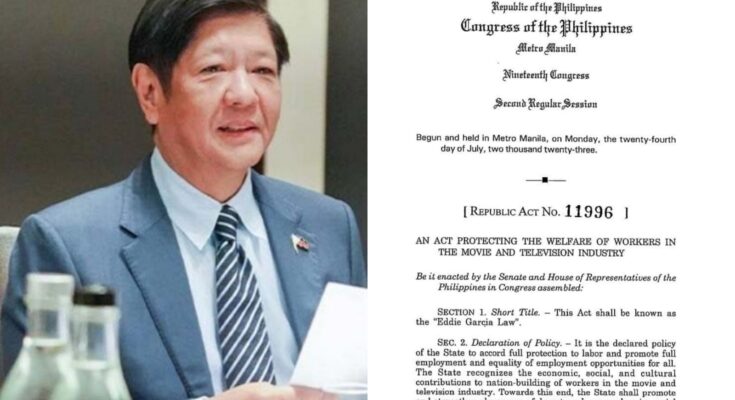PRESIDENT Ferdinand Marcos Jr. has signed a law on protecting and ensuring the welfare of movie and television industry workers, which stemmed from the demise of legendary actor Eddie Garcia while filming on set.
Marcos signed Republic Act 11996 or the “Eddie Garcia Law” on May 24, the Presidential Communications Office (PCO) said in a news release on Tuesday.
The new law mandates the implementation of work hours, wages and other wage-related benefits, social security and welfare benefits, basic necessity, health and safety, working conditions and standards, and insurance.
Under the law, the protection of the movie and television workers should also be in line with the Labor Code of the Philippines or Presidential Decree 442 as amended, and Republic Act 11058 or the “Act Strengthening Compliance with Occupational Safety and Health Standards and Providing Penalties for Violations” and other applicable laws, the PCO said.
The Eddie Garcia Law has taken into account the gravity of the accident that caused the death of Garcia while filming.
It mandates that the worker and the employer or principal shall execute an agreement or an employment contract in a language or dialect understood by both parties before the commencement of service.
“No agreement or employment contract shall discriminate against a worker who has contracts or projects with other production outfits unless exclusivity is specified in the contract, nor shall any person perform any act involving preference based on race, color, descent, national or ethnic origin, or religion, which has the purpose or effect of nullifying the recognition, enjoyment, or exercise on an equal footing of any human right or fundamental freedom,” the law’s non-discriminatory provision stated.
As for the wages, the minimum wage of a worker shall not be less than the applicable minimum wage in the region where the worker is hired and wages shall be paid on time, as agreed upon in the contract, directly to the worker.
All workers shall also be covered by and entitled to benefits provided by the Social Security System (SSS), the Home Development Mutual Fund or Pag-IBIG Fund, and the Philippine Health Insurance Corp. (PhilHealth).
To ensure the health and safety of workers, the law mandates the employer to strictly comply with the occupational safety and health standards provided by the law.
Violators of any section of the law shall be fined up to P100,000 for the first offense; up to P200,000 for the second offense; and up to P500,000 for the third and succeeding offenses.
“If the violation is committed by a corporation, trust or firm, partnership, association or any other entity, the fines shall be imposed upon the entity’s responsible officers, including, but not limited to, the executive producer, producer, production manager, and business unit manager,” it stated. (PNA, GP)





